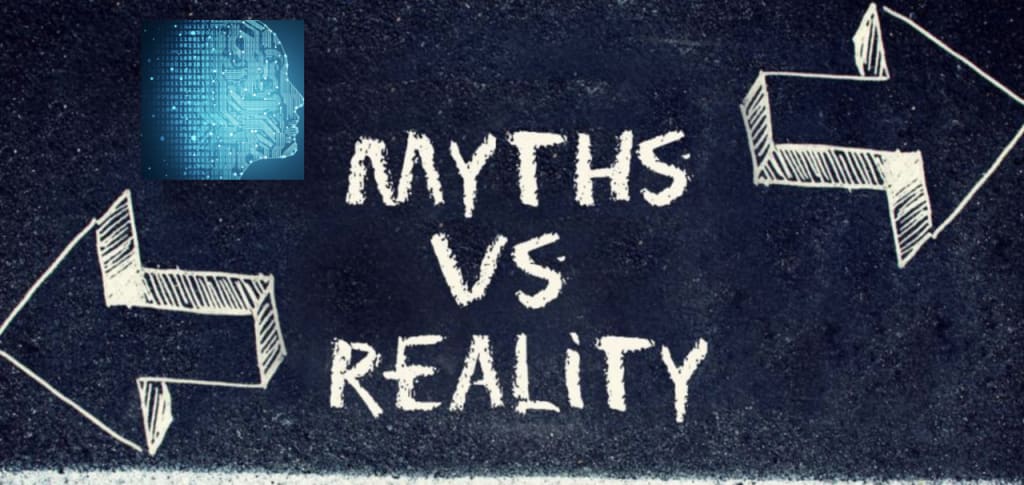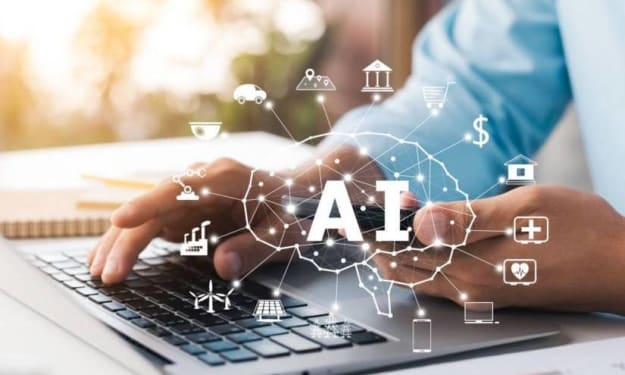Busting the Myths: The Truth and Fiction Behind Artificial Intelligence
Unraveling AI's Reality: Illuminating the Misconceptions and Understanding Its Profound Impact on Our Lives

There is no doubt that the marvels of Artificial Intelligence (AI) have permeated every facet of our daily existence. From personalized recommendations on streaming platforms to intelligent virtual assistants in our pockets, AI is no longer confined to the realms of science fiction. However, along with its widespread adoption, numerous myths and misconceptions have surfaced, often distorting the true capabilities and potential of AI. In this enlightening journey, we aim to distinguish fact from fiction, and ultimately, to understand the profound impact AI has on our lives.
The Not-So-Artificial Intelligence
Despite its name, Artificial Intelligence is not genuinely artificial; it isn't an entity operating in a vacuum, creating knowledge out of thin air. AI learns from human input, using vast amounts of data to recognize patterns, make predictions, and improve its performance over time. For example, when you use a language translation app, it's leveraging AI that has been trained on millions of text documents in different languages. The more data it processes, the better it becomes. AI doesn’t invent; it learns, adapts, and enhances.
The Misconception of Self-Aware Machines
One prevalent myth about AI is that it is sentient and capable of experiencing human-like emotions or thoughts – a trope often dramatized in sci-fi movies. While AI can mimic human behavior and carry out complex tasks, it's essential to remember that these machines are not sentient. They don't possess self-awareness or consciousness. When Siri or Alexa responds to your questions, it's not because they understand you but because they've been programmed to recognize patterns in your speech and respond accordingly.
AI is not 'One-Size-Fits-All'
Artificial Intelligence isn't a singular, homogenous entity. Instead, it's a wide-ranging field comprising various subfields, such as Machine Learning (ML), Natural Language Processing (NLP), and Robotics, to name a few. Each of these fields has distinct goals and methods. For instance, while ML focuses on enabling machines to learn from data, NLP seeks to facilitate human-machine interaction using natural language.
The Myth of AI Supremacy and Job Loss
It's common to encounter fears of AI 'taking over' human jobs, leading to widespread unemployment. But this is a gross oversimplification. In reality, AI is reshaping the job landscape rather than annihilating it. Just as the industrial revolution gave birth to new job roles while making some obsolete, AI is likely to spawn new professions we can't yet conceive. Think of Radiologists. AI can assist them in quickly analyzing medical images, thereby enhancing their productivity and accuracy, not replacing them.
The Fiction of Malevolent AI
The myth of malevolent AI plotting humanity's downfall is, quite simply, the stuff of science fiction. The truth is, AI can indeed be dangerous, but not in the way many people imagine. The real risk comes from misuse or irresponsible use, rather than the AI itself turning rogue. For example, deepfakes – AI-generated images or videos that mimic real people – can cause significant harm if used maliciously. Therefore, the call should be for ethical, responsible AI use and development, rather than fearing an improbable AI uprising.
AI and Privacy: A Balancing Act
AI's ability to process vast amounts of data often raises privacy concerns. While these concerns are valid, it's not AI itself that's intrusive; it's how we use it. The onus falls on us to devise data collection and use policies that respect user privacy while leveraging AI's benefits.
AI: A Transformative Tool, not a Magic Wand
While AI has immense potential, it is not a silver bullet solution to all problems. Its effectiveness is determined by the quality of the data it's trained on, the robustness of the algorithms, and the suitability of the problem at hand. For instance, AI has been instrumental in managing and predicting COVID-19 spread. However, this would not have been possible without accurate, comprehensive data and expert human guidance.
Artificial Intelligence: Fostering an Informed Perspective
Debunking these myths helps us foster a balanced and informed perspective on AI. It's neither a harbinger of doom nor a panacea for all ills. AI is a tool, a remarkable one, with the potential to revolutionize industries, healthcare, education, and more. However, the key to harnessing its benefits while mitigating potential risks lies in our understanding, approach, and regulations.
As AI continues to evolve, let's inspire curiosity and encourage a culture of learning and understanding. Let's move beyond fear and misunderstanding, towards a future where we coexist with AI, leveraging it as a catalyst for progress, innovation, and enrichment of human life. After all, in the grand scheme of things, AI is not an alien force, but a product of human ingenuity, mirroring our intelligence and enhancing our capabilities.
AI: Busting the Myths and Building Bridges
While it's vital to debunk the myths surrounding AI, it's equally important to build bridges that connect us to this innovative technology. AI isn't something to be feared or idolized, but rather understood and applied effectively. When we engage with AI through an informed lens, we're better positioned to leverage its power for positive societal change.
AI in Everyday Life
A common misconception is that AI is reserved for high-tech laboratories and major corporations. However, the reality is that AI is intricately woven into our daily lives. Whether we're asking Siri for the weather forecast, receiving personalized content on social media, or navigating our commute with Google Maps, we're engaging with AI. Understanding its pervasive presence helps us to see AI not as an impersonal, remote technology but as a beneficial tool that enriches our everyday experiences.
The Democratization of AI
Another myth is the exclusivity of AI - the idea that only tech giants or specialized professionals can harness the power of AI. The reality is that AI has become more accessible and democratic. Numerous open-source platforms and libraries, such as TensorFlow and PyTorch, are available for anyone interested in learning about or developing AI systems. Similarly, user-friendly AI services, like IBM Watson or Google's AutoML, are enabling even non-technical individuals and small businesses to leverage AI's capabilities. This democratization empowers us to not only use AI but also contribute to its evolution and impact.
The Potential of AI in Tackling Global Challenges
AI is often perceived as merely a tool for automation and efficiency. However, its potential extends far beyond these confines. AI is instrumental in addressing some of the world's most pressing challenges. For instance, AI has been crucial in the fight against climate change, helping to optimize energy consumption, predict weather patterns, and track carbon emissions. In healthcare, AI is being used to predict disease outbreaks, personalize treatment plans, and expedite drug discovery. These real-life applications underscore AI's transformative potential when harnessed responsibly and creatively.
AI Education: A Path to Empowerment
Perhaps one of the most pervasive myths is that understanding AI requires advanced technical expertise. This myth perpetuates the disconnect between AI and the general public. However, many organizations and institutions are working hard to make AI education accessible to everyone, regardless of their background. Online courses, workshops, and coding bootcamps provide an array of learning opportunities to grasp AI concepts and applications. By encouraging AI literacy, we can foster a society that is not only comfortable with AI but also equipped to influence its development and utilization.
AI: An Ongoing Journey of Discovery
As we journey through the world of AI, it's important to remember that it's a dynamic, evolving field. We're continually learning, improving, and redefining what's possible. Each myth we bust, every bridge we build, takes us a step closer to a future where AI is understood and used to its full potential. However, the journey doesn't end there. As AI continues to evolve, so too must our understanding, our questions, and our conversations.
AI is not a dystopian future or an incomprehensible mystery; it's a tool we've created to solve complex problems, improve lives, and explore new frontiers. By busting the myths, understanding the realities, and embracing the possibilities, we're not just learning about AI – we're defining our shared future.
In the grand tapestry of human progress, AI is but one thread. It's a thread that reflects our ingenuity, our ambition, and our relentless quest for knowledge. As we continue to weave this thread, let's do so with understanding, responsibility, and a shared vision of a future where technology and humanity are not at odds, but in harmony.
Embracing AI: Steering the Course of Our Collective Future
As we dismantle the misconceptions and embrace the realities of AI, we're not just observers of a technological revolution – we're active participants. By demystifying AI, we equip ourselves with the knowledge and perspective to navigate its possibilities and challenges. It's a journey we undertake collectively, influencing and shaping the impact of AI on our societies, our economies, and our personal lives.
AI: The Catalyst for Dialogue and Engagement
While we've covered the surface of AI, there is much more to delve into. The power of AI lies not only in its technological prowess but also in its ability to ignite conversations and stimulate critical thinking. It challenges us to reevaluate our perceptions, question our assumptions, and explore uncharted territories. AI is as much about technology as it is about people – it reflects our curiosity, our creativity, and our shared pursuit of advancement.
Opening the Floor: Your Thoughts on AI
As we conclude this journey of busting AI myths, it's essential to keep the dialogue open and ongoing. The discourse around AI should not be a monologue by a select few but a widespread, inclusive dialogue. Your voice matters. Your perspective shapes the narrative.
So, we leave you with an open-ended question, aimed at fostering further thought and conversation: "How has your understanding of AI changed over time, and in what ways do you foresee AI influencing your life in the future?"
By sharing your thoughts, experiences, and insights, you're not just responding to a question – you're contributing to a broader discourse, influencing the future of AI, and helping shape the trajectory of our collective journey. The story of AI is still being written, and we all hold the pen. Let's write it together.
About the Creator
Alden Pole
Delving into captivating topics, I share insightful content that informs and inspires. Join me on this journey of discovery and let's explore the wonders together!






Comments
There are no comments for this story
Be the first to respond and start the conversation.